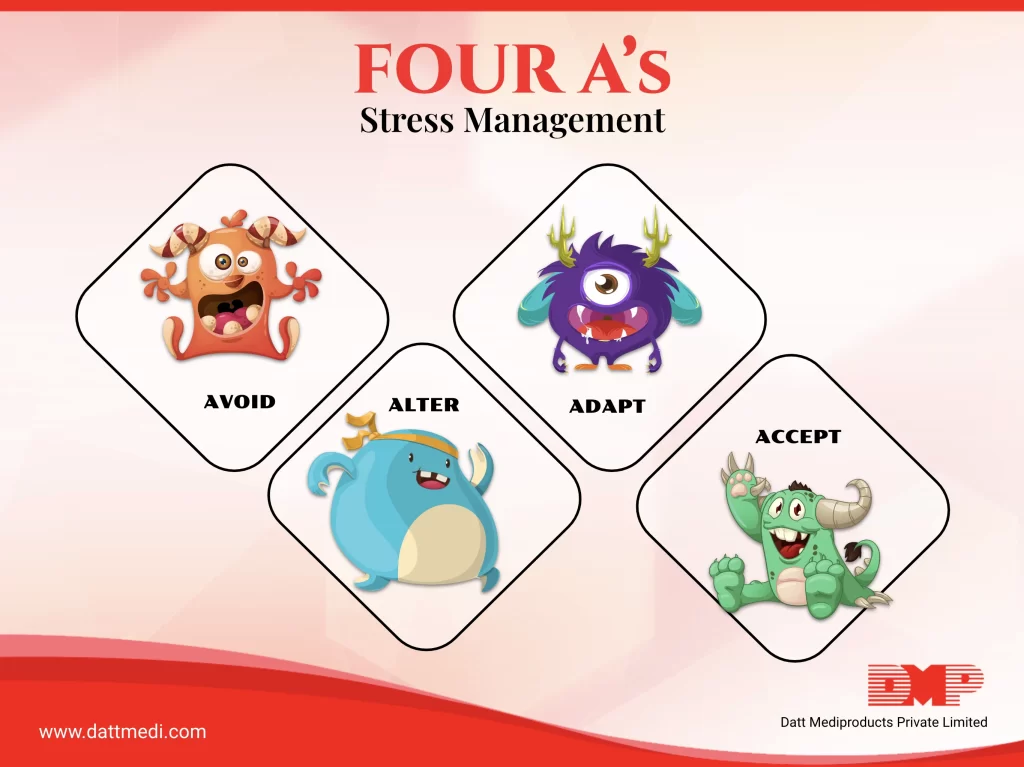
Are you overworked?
Is your work from home causing you stress?
Is your stress weighing you down?
It’s time to balance your life either by controlling the stressors or by coping with them or both.
Today most of us suffer from stress but are not open enough to discuss the problem. Stress is one of the mental problems which needs to be properly addressed, either on our own or with the help of mental health professional.
We, list down the well-known 4 A’s of stress management, viz. Avoid, Alter, Accept, and Adapt. You may wish to try using one or all of these strategies.
AVOID Unnecessary Stress:
Identify the stressors in your life, look at your habits, excuses, attitude, etc. Unnecessary stressors can really impact your mental health. Try to manage the things under your control such as avoid people who bother you, and learn to say no if you can’t accommodate that extra piece of work. Don’t accept it when you don’t wish to. Be planned with your daily to-do list as per the importance and need of the hour. You can’t do everything every time and it is okay.
ALTER the Situation:
If you can’t avoid the stressors, try to avoid them. There are some things which are under your control and which you can manage. Take inventory and strive to change the situation for the better. You can’t alter other’s behavior but you can definitely and respectfully ask others to change the part that bothers you; in doing so learn to communicate your feelings openly which helps to keep the frustration apart. State work limits and manage your time in a better way, landing your spare time for yourself or you may also wish to indulge in some hobby.
ADAPT to the Stressor:
It is best to adapt to a stressor when you can’t avoid or alter it. Adapting means you are changing your expectations and standards, thinking that you can’t cope with them. Adjusting your standards is one of the best ways to deal with stress and frustration. One of the main reasons for stress is “Perfectionism”
You can’t be perfect at all times and the habit of being so can really stress you out. Sometimes doing just good is enough. Avoid overdoing just for the sake of perfection. Keep gloomy negative thoughts away; adopt some mantra such as “All is Well” & “I can do it” which you can repeat in your mind in difficult situations. Practice forgiveness and free yourself from negative energy and just move on.
ACCEPT the Unchangeable Things:
Sometimes we are left with no choice but to accept things and the situations as they are. This is because we can neither avoid the stressors nor are they alterable and adaptable. Although it can be a little difficult, accepting does help to keep stress under control. Talk to someone close, pour your heart out, go on a coffee break, control your anger which dwells on your energy, practice forgiveness because you can’t change everyone and everything, let positive thoughts dwell in your mind, introspect yourself, practice positive self-talk, learn from your mistakes, try not to repeat them.
If you wish to know more then read our blogs “Care for your Mental Health” and “Walk for Your Body & Mind” to keep stress at bay and visit us at www.dattmedi.com.




